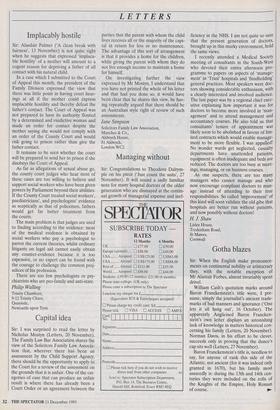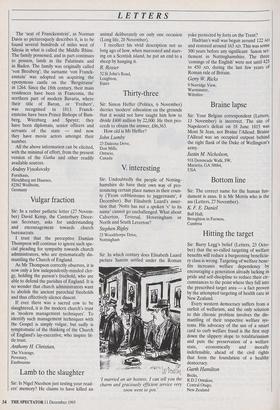Gotha blazes
Sir: When the English make pronounce- ments on continental nobility or aristocracy they, with the notable exception of Mr Alastair Forbes, almost invariably spout drivel.
William Cash's quotation marks around Baron Franckenstein's title were, I pre- sume, simply the journalist's ancient trade- marks of bad manners and ignorance (`One lets it all hang out', 16 October). The apparently Anglicised Baron Francken- stein's own letter displays an astonishing lack of knowledge in matters historical con- cerning his family (Letters, 20 November). Norman Davis, in his effort to be clever, succeeds only in proving that the dunce's cap sits well (Letters, 27 November).
Baron Franckenstein's title is, needless to say, for anyone of rank this side of the Atlantic, not ancient (for it was indeed only granted in 1670), but his family most assuredly is: during the 13th and 14th cen- turies they were included on the rolls of the Knights of the Empire, Holy Roman of course.
LETTERS
The 'seat of Franckenstein', as Norman Davis so picturesquely describes it, is to be found several hundreds of miles west of Silesia in what is called the Middle Rhine. The family possessed, and in part continues to possess, lands in the Palatinate and in Baden. The family was originally called `von Breuberg'; the surname 'von Franck- enstein' was adopted on acquiring the eponymous castle on the `Bergstrasse' in 1264. Since the 18th century, their main residences have been in Franconia, the northern part of modern Bavaria, where their title of Baron, or 'Freiherr', was recognised in 1813. Frank- ensteins have been Prince Bishops of Bam- berg, Wiirzburg and Speyer; they have been diplomats, senior officers and servants of the state — and now they have movie actors amongst their number.
All the above information can be elicited, with the minimal of effort, from the present version of the Gotha and other readily available sources.
Andrey Vysokovsky
Forsthaus, Hirschberg am Haarsee, 82362 Weilheim, Germany



































































 Previous page
Previous page